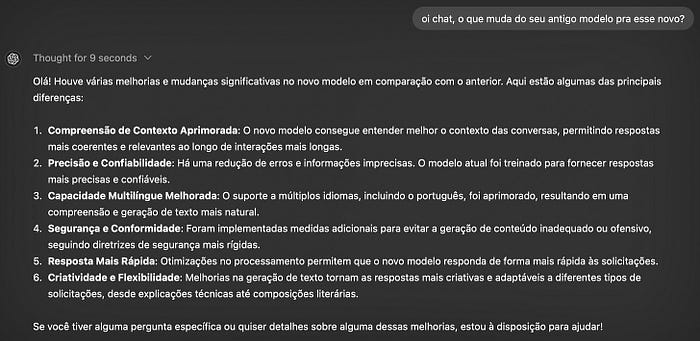chatgpt updates
new york, united states 🇺🇸
sunny saturday rent a truck went to get a coffee at Arabica, but this time I went to their headquarters in front of the brooklyn bridge, because wanted to wait in line I saw on tiktok that the view was beautiful — I’m just a tourist who wants to see beautiful things, take beautiful photos…
how much would the rent be for this establishment?

anyway, so I was there in line waiting when I saw there was a new video from hannah montana lucas montano — yay! — commenting on the new chatgpt update — yay! — and I swear I almost left the line and went back home to get my computer to play with prompts after seeing him get the code he requested from the chat and make a little program run without editing anything the robot sent to him.
I resisted the temptation, got the dark latte (review: the hot is better than the iced) and went to sit on a little bench there facing the manhattan view, it was such a nice sunny day… then a gentleman sat next to me:
- can you use the metro card to take the ferry little boat?
- I don’t know, I’m a tourist too.
he smiles, turns to his phone mounted on a selfie stick says some things in Chinese, gets the response, turns to me:
- chatgpt says there’s no such integration.
and that’s how we started a conversation about artificial intelligence, freedom of expression, china, I used my limited knowledge of mandarin to entertain the gentleman
- wo shi bashi ren (I am Brazilian)
he replied very slowly that he is zhongguoren (Chinese — very cute).
and so against all my expectations I added a second new york friend on wechat — yes, this is the second Chinese gentleman I end up chatting with for hours here in the city. maybe this is my spirit animal: a Chinese gentleman.
what’s new in the new gpt?
first, before it would respond quickly and all wrong, now it takes longer and returns everything not so wrong.
there’s a “loading” notice except instead of “loading” it uses human adjectives like “thinking”, “finding methods”, “looking for alternatives”, “checking ethical issues” (seriously)… all this because it probably runs the question through multiple algorithms to refine it better.
in the new model’s words, these are the differences:
curious that it doesn’t say anything technical

end of programmers
has the game changed and will programmers lose their jobs before everyone else?
every now and then some CEO from wherever leaks saying that in 5–10 years we won’t have programmers anymore. of course business people are always hoping to pay $20 for a platform rather than $10k for a professional.
besides that, there’s pressure, their mountain of money depends on knowledge they don’t master. this is the whole history of capitalism, it was with this same line of reasoning that most factory workers were replaced by machines.

in other words, it’s inevitable that we’ll have fewer programmers and that the entry door to the job market will become increasingly difficult. no job is ever guaranteed.
is it still worth learning to program?
if work opportunities in this area end, I’ll continue programming things I like, but it won’t be my livelihood anymore and, if that ends up hurting my income, patience, we’re all in the same boat here — or are you a mega-multi-millionaire with nothing better to do reading this text, friend?
building things on computers will still require programming knowledge, what will change, of course, is how we program — something that has already been changing and developing over time:
before, to position an element on a web page we used tables, then frameworks, then more fluid libraries, always looking at documentation and properties; then through software like figma you design everything visually with elements and it gives you a corresponding code to insert in a larger context…
and now we have the possibility to speak in Portuguese and the chat gives code in machine language — without necessarily having to understand everything that’s written (if it works lol), but still it’s important to at least know how to manipulate what’s written there.
it’s easier to change 3 letters yourself and change the positioning of something than to edit everything in the visual platform — in the case of the figma example — or ask the chat to change everything again. right?
is it the end of other professions?
I haven’t seen the reviews of what changed for screenwriters, copywriters and other text based professions, personally I don’t think any profession will end and if it does, we’ll figure out how to find other ways to make a living — patience.
and if there’s no livelihood for anyone, things will get rough for everyone… which I think is very likely. I think it’s worst for young people, how do you enter a job market like this? very hostile, but these are topics I don’t want to get into today.
what worries me is the end of other things…
if technologies have already replaced many manual activities and now replace most “intellectual” or “entertainment” jobs, why will the richest need to “distribute” their wealth to the poorest?
far from me being malthusian, but there are “too many people” — at least for this system. if one more dies it won’t make a difference in the workforce and that’s scary.
it’s what fernanda torres said the other day:
there’s a no longer hidden feeling of — what if we just get rid of this misery?
death is usually an expense, a waste that cannot be recovered or reintegrated into the traditional economic system… but as philosopher Bataille said, when we have everything in abundance, death becomes a luxury of sovereignty.
and that’s the moment we’re living in, it’s becoming possible to pay to get rid of people, not just poor Latin American, Arab, Asian people… but did you see the other day the story of the Canadian para-athlete?
she had been asking for a wheelchair ramp for about 5 years, and recently they responded to her that if she was living so badly, if she was so desperate that they could pay for everything she needed to have assisted death.
so, if asking for basic mobility rights in a rich country gets you one of these, imagine for the rest of the world. D2 dropped the lyrics at Rock in Rio this weekend: “the favela hasn’t won, it’s still starving”.

this talk is very morbid and kind of exaggerated… maybe it’s not that bad, right?
maybe they’ll pay us a universal basic income to exist, in case they need us for something, a spare tire — a spare tire that has to work on completely meaningless things and on top of that with artificial intelligence help.
besides that, this necropolitics vibes concept from Mbembe is as overused as Byung Chul-han’s ‘burnout society’ concept…
so after this brief conspiracy theory about the end of employment being related to perhaps our future extinction (and by “our” I mean non-multi-millionaires) I bring a quote from Mbembe in a newer work than necropolitics:
the fracture, fissuring and exhaustion concern not only resources, but also living bodies exposed to physical exhaustion and all types of biological risks, sometimes invisible.
in this newer book he doesn’t discuss so much about the articulations that lead to mass death policies, but more about what happens to those who remain. the book is called ‘brutalisme’ and I really think that what we’re living is violent and brutal.
not just the situation of job instability and precariousness, but environmental security too (with all these fires and toxic products in general)… this brings me back to chatGPT and to the ending of the text…
and what about the environment?
these days in my bubble people were sharing that a simple question to the chat uses quite a lot of energy-water. one question to the bot consumes 15x more energy than a question to google:

apparently we’re changing a whole paradigm on the internet, before we had information distributed across millions of sites that are gradually dwindling.
first by the steamrolling that was the centralization of information on social networks and now even more centralized, because it’s preferable to ask the bot something and get an answer right away than the famous internet browsing, exploring sites/blogs, clicking on different blue links and discovering different websites like the ancient mayans did 🌈
we have fewer and fewer forum posts — even stackoverflow, the adventure companion of every programmer for more than decades, is dwindling:
here’s a nice post about it

in other words, the energy consumption with these servers and various databases is gradually being centralized in networks & chat.
finally, a rant.
if you stop sending prompts to chatgpt will it really save the planet from an environmental catastrophe — well, I don’t think so.
what would really be effective:
- changing the global oil energy matrix and reducing extraction and production in general;
do we have the guts to do something about this avoiding the possible extinction of the species? no. do we care about it? yes! but what have we learned from the last decade? taking 5-minute showers, stopping eating meat (at an individual level) and using metal straws didn’t change the course of things much.
in parallel, what would really be effective regarding chatGPT?
- fierce regulation of digital tools by states and other institutions of different levels of power and areas of production.
unfortunately, we have no power over this and giving up using this tool when it can really be useful is giving up a long hot shower after exhausting work miserable comfort.
will judging people who use the tool really save society from a decline in basic text interpretation? — well, I don’t think so.
and this isn’t a personal defense, nobody came to criticize me, I’m not a super heavy user, I’m not a defender of big companies, much less a techno-optimist (I’m not optimistic about anything apparently).
actually, I like doing many things from scratch — like this news — but I use chat for others, yes. no neurosis.
still on the subject of artificial intelligence, for those interested, a few years ago I wrote a text based on an Alan Turing article — “can machines think?”
here’s an excerpt and the access link — it’s on medium:
Humanity flirts with the idea that another being, devoid of a soul, can perform difficult tasks for it. Before, it was black-skinned people subjected to repetitive and tiring work, with the pretext that they didn’t have a soul or feelings.Now we shape the machines to do the heavy work, including the cognitive one, because those machines don’t have a soul… do they? To unravel this mystery, Mr. Turing proposed the development of a guessing game…
that’s all for now,
take care, see you next time, friend.
